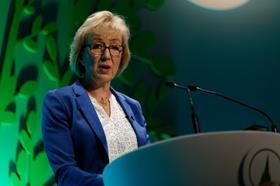
Environment secretary Andrea Leadsom has hinted that British producers may be allowed to continue hiring EU migrants post-Brexit.
In her speech to the Oxford Farming Conference, Leadsom acknowledged how important seasonal labour from the EU is to farmers and said the government was committed to working with them to ensure they have “the right people with the right skills”.
She also paid tribute to the tens of thousands of EU seasonal workers that contribute to the British farming industry - around 30,000 of whom are employed in the labour-intesive softfruit industry alone. But when asked how the government will maintain access to this workforce from outside the EU, Leadsom refused to “go into the specific policy details”.
“I’ve spoken very directly with the Home Office about this matter,” she said. “They are looking at it very closely and it is fully our intention to ensure that the labour needs of the food and farming sector are met.”
Leadsom’s comments follow clues from other government ministers in recent months. In December Brexit Secretary David Davis suggested the government would do “what is necessary for fruit picking” when discussing skills-based migration for EU citizens; and in October Chancellor Philip Hammond said he wanted to look at an “appropriate way of looking at the needs of the agricultural sector in a migration control regime between the UK and the EU”.
Despite the government’s lack of clarity on seasonal labour access, Leadsom did emphasise on the need to do away with EU red tape. “I will be looking at scrapping the rules that hold us back,” she said.
One piece of EU legislation that she singled out in her talk was the “three-crop rule”, which obliges farms with more than 30 hectares of arable land to grow at least three crops and farms with more than 10ha to grow two.
“I’m quite sure everyone here can still think of at least one piece of EU regulation you won’t miss,” she said, going on to promise “no more 6-foot EU billboards littering the landscape; no more existential debates to determine what counts as a bush, a hedge or a tree; and no more ridiculous, bureaucratic three-crop rule.”
Regulations like these – as well as other key issues such as market access to the EU, trade agreements with the rest of the world, subsidies and farming regulations – will soon be up for discussion at a consultation between Defra and UK farmers. A date for this has not yet been set.



